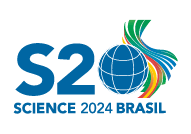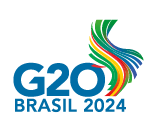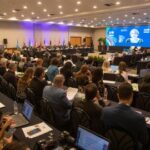S20, G20’S scientific arm, begins this monday (11) in Rio de Janeiro
MARCH 10 | Folha de S. Paulo
Just like the G20, chaired by Brazil this year, the S20 (Science20) will also take place here and will seek to provide recommendations and actions for the world leaders of the largest economies.
The S20 emerged in 2017 as a relatively recent engagement group linked to the G20, compared to the G20 itself, which dates back to 1999. It brings together the 19 national academies of sciences from the countries with the largest GDP (Gross Domestic Product) and the scientific representation of the European community.
While discussions in other G20 fora tend to focus more on economy and development, the S20’s business is science. Not that these discussions are distant. “All of this is dependent on science,” says Helena Nader, president of the ABC (Brazilian Academy of Sciences).
FOTO: The biomedical scientist, professor, researcher, and president of the Brazilian Academy of Sciences, Helena Nader, sitting and smiling in her laboratory at Unifesp (Federal University of São Paulo) – Eduardo Knapp – Mar 22, 2022/Folhapress
Brazil will be the eighth host of S20 meetings, which have already taken place in Germany, Argentina, Japan, Saudi Arabia, Italy, Indonesia, and India.
Nader is already a seasoned participant in the event. The edition in Rio de Janeiro will be the fifth in which she has participated. The difference is that this time she will be the sherpa — a sort of overall leader.
According to Nader, the various meetings that make up the S20 —the opening and division of work will take place on Monday (11) and Tuesday (12)— aim to point out what all these scientific academies propose as relevant for the whole world, including countries outside the G20.
The 2024 edition of the S20 has the motto “Science for Global Transformation” and will focus on five central thematic axes: bioeconomy, health challenges, artificial intelligence, social justice, and energy transition.
Nader emphasizes the importance of looking at all these themes without neglecting the social aspect. “We’re talking about bioeconomy. Everyone knows what it is, but it needs to consider the social aspect. Bioeconomy cannot be disconnected from the territory, just like energy transition. If you only focus on the economic aspect and ignore the social aspect, it won’t work,” says the sherpa.
The meetings, like those of the G20, will spread throughout the year.
According to Nader, Brazil, as the host of the S20, does not come with the intention of pushing a final document ready for other nations, a leadership strategy that has brought problems, for example, in the India edition. “The countries didn’t want to sign the document,” she says.
The idea is to build a document that reflects the thoughts of all present actors. Basically, at the end of the S20, a detailed document is prepared and shared among the academies. This larger document generates a smaller one and the recommendations that are forwarded to the G20.
Nader states that the convergence of ideas is also important because of the 2030 agenda, which can be summarized, in a generic way, as an action plan for sustainable development.
“Without convergence, it won’t happen,” says the sherpa. “The 2030 agenda is coming to an end, and we are far from achieving the 17 goals.”
In addition to national academies, the Brazilian edition brings the novelty of the presence of other international scientific organizations. The participation of the IAP (InterAcademy Partnership), ISC (International Science Council), TWAS (The World Academy of Sciences), IANAS (Inter-American Network of Academies of Sciences), and AASSA (Association of Academies and Societies of Sciences in Asia) has been confirmed.
Finally, the geopolitical tensions present in the G20 do not gain as much traction in the S20, according to Nader.
But, logically, politics and science overlap in various aspects. The sherpa mentions what has been happening with scientific policy in Argentina under the government of Javier Milei. Argentina is also part of the G20.
The Argentine president abolished the Ministry of Science and Technology and significantly reduced the budget of Conicet (National Scientific and Technical Research Council).
There has been international reaction due to the scientific situation in Argentina. The ABC itself has expressed, in a statement, “deep concern about the recent statements and actions of the Milei government” and expressed solidarity with the Argentine scientific community.
Recently, 68 Nobel laureates stated in a letter to the Argentine president that the country’s science “is approaching a dangerous precipice.” The laureates urged Milei to reconsider the budget cuts to Argentine educational and research institutions.
“The political vision is very narrow-minded. It doesn’t understand the purpose of science,” says Nader.




